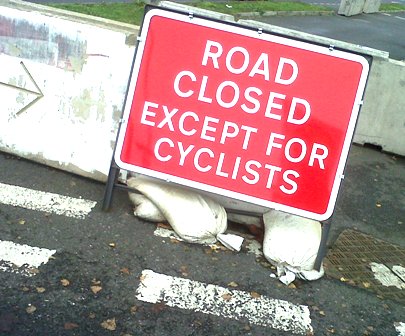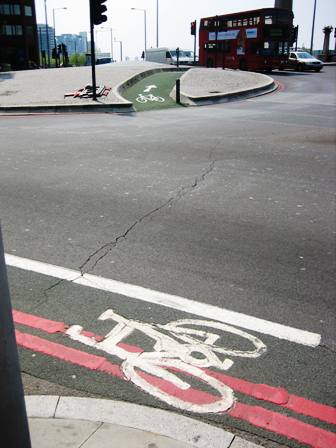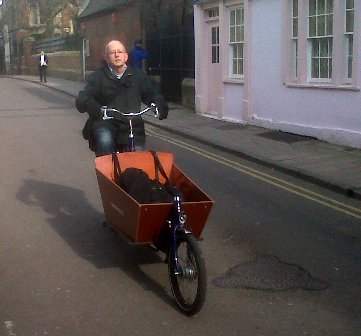
A rare and beautiful sight for anyone who is riding a bike
Getting Britain cycling: a golden age of active transport
The All-Party Parliamentary Cycling Group’s report Get Britain Cycling sets out an achievable vision of a nation embracing active transport but also sets some clear challenges to our elected representatives. In considering the current context of the report Jonathan Ives wonders whether Get Britain Cycling will prove to be a tipping point or too big an opportunity for politicians to comprehend.

A rare and beautiful sight for anyone who is riding a bike
With a couple of days of April 2013 still left on the calendar a few hundred short of 40,000 people had added their names to e-petition 49196, which calls on the prime minister to pledge that the government will implement the recommendations of the Get Britain Cycling report. While it is unlikely that Mr Cameron or even his deputy is quaking at this online expression of the public’s will, a few of the prime minister’s plethora of special advisers, interns and policy tasters may have noticed that this number of signatories was clocked up within a few days of the report’s publication, half of them within 24 hours; one of Mr Cameron’s wonks may even be motivated to actually read the document’s summary.
Within the document they would find a report of the All-Party Parliamentary Cycling Group’s (APPCG) inquiry into how the government might enable more people across the UK to take up cycling, cycle more often and cycle more safely. The process of receiving written and oral evidence prompted extensive media coverage and the Get Britain Cycling report itself, the first part of a three-volume report, has been widely reviewed. It contains a tantalising vision of an alternative to the UK’s current option of “travel in ways that are dangerous, unhealth, polluting and costly”, creating a nation in which “more people cycle or walk, public health improves, obesity reduces and roads become safer”. It is, the report concedes, a bold vision but one that can, by changing how people travel, create places where people want to live, work, shop and do business. “Put simply,” the report states both baldly and boldly, “Britain needs to relearn how to cycle. This report sets out how this can be done.”
But how realistic is the prospect of a Britain reborn with cycling at the heart of transport choices? Are we, as some enthusiasts claim, on the verge of a golden age of cycling that will make our current traffic-clogged roads and exorbitantly priced railways seem like a mystifying netherworld to future generations? Well, we could be. In the 21st century the UK has seen a remarkable growth in cycling, both as a sporting or recreational pursuit and as a transport option, accompanied by an unprecendented profile for cycling within the media and the wider public understanding. The sporting success of the Brailsford boys and girls has undoubtedly played a major part in putting British cycling on a metaphorical and, in terms of the incessant visits to the podium, literal pedestal.
This unprecedented success on both road and track has brought not only a succession of Olympic medals, European Grand Tour success, world championship jerseys and (the big one) BBC sports personality of the year awards but also served to put more people on bikes, whether their destination is a cyclo sportif measured in hundreds of kilometres or a trip to the local shops measured in hundreds of seconds. Any UK resident who spends any time using the road network could point to a noticeable increase in cycling on the basis of their own observation. In London, where bike use has apparently doubled since 2000, there is now an obvious contradiction between the numbers of bikes on the road and the space made available for them in a car-dominated transport environment; indeed the APPCG report notes that during rush hour there are now more bikes than cars crossing the capital’s bridges over the Thames.
All this profile and practice has prompted the beginnings of political support for cycling and the interests of those who choose to make a bike part of their transport choices. The decision by the elected mayors of London (note the plural: Ken then Boris) to invest public funds in a hire bike scheme was perhaps the most visible evidence of the investment of political capital in the interests of the bike. More recently Mayor Johnson has made a series of extraordinary proposals and accompanying investment claims for the expansion of cycling infrastructure in London, including improvements to the proposed and existing cycle superhighways, redesigned major junctions, better separation of bikes and motor traffic on the roads and a new network of ‘quietways’ around the city, all with a price tag in excess of £900 million over ten years. The APPCG report itself offers a clear vision of what politicians need to do to realise the full potential of cycling. It calls for a new priority for cycling within public investment, a comprehensive re-imagining of design standards for roads, streets and communities, safe speed limits and safer driving, more training and education, and genuinely committed political leadership.
However, scepticism still exists and not without reason. While cycling in the UK is growing, it is still woefully small in comparison with other nations. Less than 2% of journeys in the UK are made by bike. Compare this with the Netherlands’ 27% or Denmark’s 19%; as the APPCG report notes, “even Germany manages 10%”. Boris Johnson’s plans for London’s cycling infrastructure are, as with everything Johnson touches, long on hyperbole and short on reliable detail. The proposals have been examined by a number of interest groups and some have found grounds to question the validity of the funding projections and the viability of many of the headline-grabbing proposals. To this one might add the appointment of Andrew Gilligan as the mayor’s commissioner for cycling. Gilligan is working two days a week and allegations persist that this post is a sinecure as reward for his coverage of the mayoral elections for the Evening Standard, campaign reporting that some allege undermined any pretence the Standard might have to impartial coverage and actually threatened the democratic process. Even the Barclays cycle hire scheme – widely referred to as Boris Bikes – has come under fire, with users decrying the doubling of charges, poor maintenance records and declining standards as the Serco-managed system tries to pare its costs.
If nothing else, the Get Britain Cycling report offers an insight to the scale of the task that the UK faces if it is to transform cycling attitudes and infrastructure. “To realise the full potential of this vision will require a fundamental cultural shift in how we think about the way we travel,” it says and emphasises the need for politicians to grasp this potentially uncomfortable nettle. Nor are the challenges restricted to politicians. A report titled Understanding Walking and Cycling produced by a team from Lancaster University, Oxford Brookes University, the University of Leeds and the Engineering and Physical Sciences Research Council, found that there are a myriad of complex attitudes and assumptions that have to be addressed before a great many people would consider making riding a bike one of their transport options. This report found that while attitudes to walking and cycling are mostly positive or neutral, many people who would like to engage in more active travel fail to do so owing to a combination of factors. The report summarises these under three main headings: concerns about the physical environment, especially with regard to safety when walking or cycling; the difficulty of fitting walking and cycling into complex household routines, especially with young children; and the perception that walking and cycling are in some ways abnormal things to do.
However, despite the extensive grounds for concern amid the hyperbole of political grandstanding and the enormousness of the challenge, there are many involved with the promotion of cycling who remain buoyed by progress to date and the opportunities that are emerging. Peter Treadgold, a transport infrastructure expert, cycling consultant and author of the Chartered Institution of Water and Environmental Management’s (CIWEM) recently published active transport policy, is one such enthusiast.
“There is always going to be fast-forward and some back-pedalling by politicians but there are genuine grounds for optimism,” he said. “For all Boris’s showmanship, it is unprecedented for a high-profile politician to be so outspoken in their support for cycling and so clear in their commitment to the improvement of infrastructure for people who choose to ride a bike. One or two of the proposals may be a bit ‘back of the envelope’ but the plans for things like the cycle superhighways, cross-London corridors and the improvement to major junctions are long-term projects that will be delivered. I think that we can detect an important change in the profile of cycling and in the recognition of riding a bike as a positive transport choice for what we might call ‘ordinary people’ – people who don’t consider themselves to be cyclists.”
It may be that for all the high-profile features within the mayor’s proposals – biking on the Embankment, closing part of the Westway to create an elevated bike lane – the smaller-scale elements of the plan – the redesign of junctions, the commitment to more segregation of bikes and motor traffic, the desire to “de-Lycra-fy” cycling – will prove most effective and most influential; they may also prove to be the elements of London’s plans for cycling that are most easily transferred and replicated to other parts of the UK.
Get Britain Cycling could yet prove to be a timely trigger for cycling, moving it from the sidelines to the centre of political debate. Whether riding a bike will become a mainstream transport choice or remain the preserve of the committed and eccentric will depend upon a wide range of factors, not least cycling’s current political momentum overcoming the demands of the electoral cycle and the apparently perpetual short-term approach to national strategic thinking. It is also notable that the APPCG’s report looks, as so many strategy documents must, to local government to assist the facilitation and delivery of infrastructure and initiatives for the common good. This aspect of the report is astute but its implementation would require a profound change to the attitudes, currently prevalent within the coalition government, to the role of and funding for local authorities. Perhaps the most difficult of all the report’s aspirations is the re-imagining of cycling as a sensible, convenient and attractive option for everyday travel for people who do not currently ride a bike.
Get Britain Cycling is a proficient attempt to summarise the UK’s cycling predicament and plot a route towards a better future for cyclists, cycling and the greater transport good. It has been welcomed by politicians of all persuasions and celebrated by those who support the expansion of cycling as a positive development for the nation but, as the report makes clear, action needs to follow: “A window of opportunity is open, but not forever”.
Jonathan Ives is the cycling correspondent of The Leisure Review. He is also on occasions the editor.
Some useful links:
All-Party Parliamentary Cycling Group website
e-petition 49196: Promote cycling by implementing the recommendations in the 'Get Britain Cycling' report.
Understanding Walking and Cycling report
CIWEM active transport policy via the CIWEM website
The Leisure Review, May 2013
© Copyright of all material on this site is retained by The Leisure Review or the individual contributors where stated. Contact The Leisure Review for details.
![]() Download a pdf version of this article for printing
Download a pdf version of this article for printing

